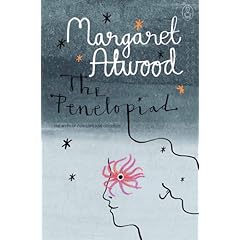However, feminist literature is certainly a valid field for feminist theory--
 since it's feminist theory turned narrative. So, without further ado, I delve into an exploration of Margaret Atwood's The Penelopiad. It's a modern, feminist retelling of The Odyssey from the perspective of Penelope. But she's dead when she's telling it, which brings all sorts of interesting implications. She opens by declaring that's she's dead, and thus knows everything. If that's true, then why does she spend so much of her time wondering why her twelve maids were killed, why Eurycleia picked them to be hanged, and other incidents during her mortal existence.
since it's feminist theory turned narrative. So, without further ado, I delve into an exploration of Margaret Atwood's The Penelopiad. It's a modern, feminist retelling of The Odyssey from the perspective of Penelope. But she's dead when she's telling it, which brings all sorts of interesting implications. She opens by declaring that's she's dead, and thus knows everything. If that's true, then why does she spend so much of her time wondering why her twelve maids were killed, why Eurycleia picked them to be hanged, and other incidents during her mortal existence.The Penelopiad is written from women's voices, alternating between Penelope with the twelve hanged maid serving as a chorus. It also brings in the voice of Helen, her beauty queen cousin. The maids were hanged for certain sexual crimes and insolence against their master, and they are bent on avenging their deaths. Their chorus both supports the tale that Penelope spins, and undermines it until the reader is caught trying to figure out the truth along with Penelope--a truth that, in typically feminist, is never arrived at.
The feminism within the work is carefully plotted. Penelope occasionally mentions ideas from her Greek society that seem almost preposterous to us--the father "selling" his daughter to the man who can win the contest; the maids whose lot (if they are especially young and pretty) is to be raped and sexually used by their master and perhaps his guests; and the role of a young noblewoman in marriage. On her wedding night, Penelope has to pretend to scream like she's being raped to satisfy the ceremonial wedding rites. This is a story where women are property, their bodies are not their own, and men control them and their lives. In the case of the twelve maids, they are hung by Odysseus after he kills the suitors.
And yet, not quite. Atwood teases out another story through the chorus of maids, asserting that they are not the Twelve Maids, but the Twelve Maidens of the goddess Artemis, the feminine goddess of chastity, the moon, the huntress who takes no man. And as there are thirteen lunar months, Penelope is the Queen of them, which she indeed has claimed all throughout the book that these Twelve are her special, beautiful, chosen maids, trained by her and used by her to keep the Suitors at bay. Then the story becomes about the repression of the cult of the Moon-goddess and a further dominance of the patriarchy.
And then the further question--did Penelope sleep with any of the Suitors? It would be difficult to resist a little dalliance, Atwood seems subtly to assert, when her husband has been gone for twenty years. The maids declare outright that they helped her in her infidelity, while Penelope maintains that she was never unfaithful to her husband, even when she heard he was off sleeping with beautiful goddesses. Or whores, if you don't believe the "high" version of the tale. But then she undermines herself by linking herself with Odysseus, the honey-tongued liar. Does she lie, or tell the truth? Apparently even dead she still buries some of the voices of her tale.
The novella is a rich and imaginative creation by one of my favorite feminist authors (read The Handmaid's Tale). A modern feminist revision of an ancient patriarchal tale offers up the sort of ideas that are easily read using feminist theories, and the most productive.
No comments:
Post a Comment